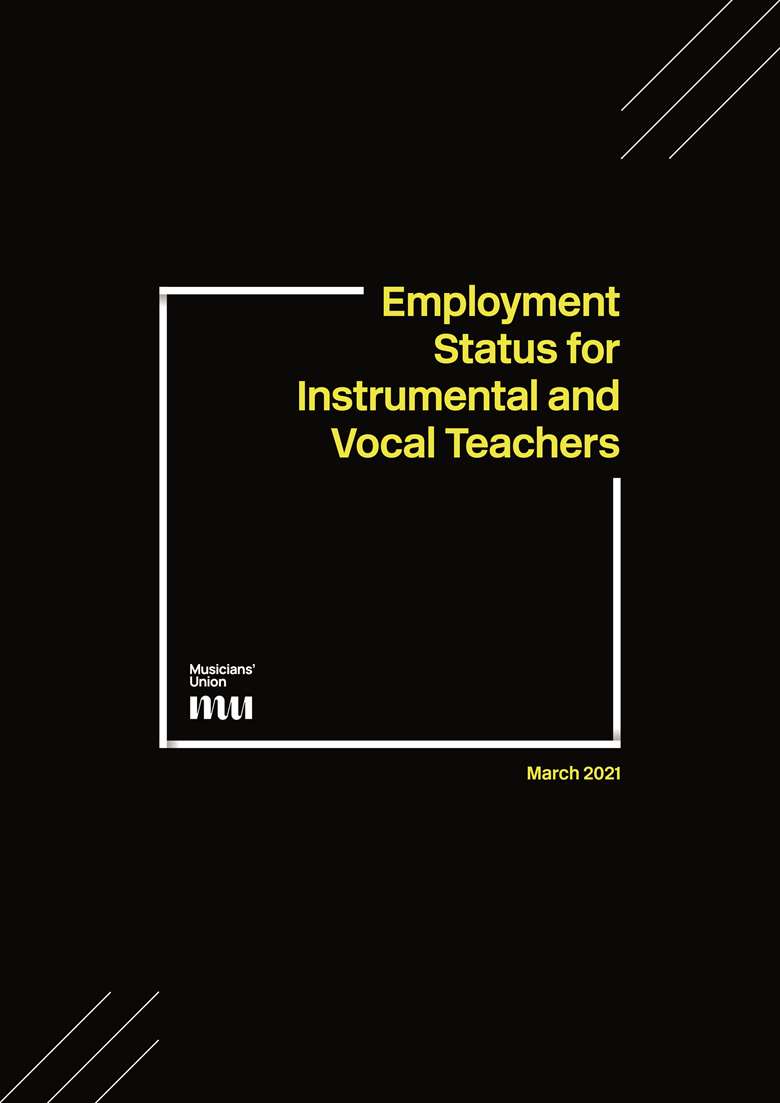MU Column: Clue up on contracts
Chris Walters
Saturday, May 1, 2021
Without a basic knowledge of employment status, instrumental and vocal teachers can fall foul of exploitative contracts. To help avoid this, the MU has produced a new downloadable guide that explains employment status, rights and more. Chris Walters, the MU's national organiser for education, elaborates.

Employment as an instrumental teacher used to be simple. You were either employed by a music service, school, college or university, or self-employed – working at home, visiting pupils’ homes or teaching in a private studio.
Today it is more complicated. Local authority cuts, the academisation of schools, new tax rules, private-sector competition and other factors have combined to create a confusing and uncertain working environment for peripatetic music teachers – one that is often characterised by bogus self-employment, the inappropriate use of zero-hour contracts and other questionable practices.
Worse still, employment conditions may deteriorate further in the coming months and years as public funding reduces due to Covid-related economic challenges, and as employment legislation evolves following Brexit. The latter is because EU-derived rights such as parental leave, protection against discrimination, holiday pay, working time regulations, GDPR and rules relating to agency workers can now be changed by domestic legislation.
What should instrumental and vocal teachers do in the face of these challenges? A good place to start is to learn about the fundamentals of employment status and rights. In doing so, teachers can empower themselves to ask the right questions, challenge contracts as appropriate and, if necessary, walk away from an offer that potentially exploits their professionalism and skill.
A new free guide to employment status
To help teachers learn more, the Musicians’ Union (MU) has published a new guide entitled Employment Status for Instrumental and Vocal Teachers. This is free to download from our website.
In the guide, you will learn the difference between full employment, worker status (also known as zero-hour) and self-employment, and why these differences matter. For example, did you know that employees have the following rights that workers do not?
- The right not to be unfairly dismissed (after two years’ service)
- Statutory redundancy pay (after two years’ service)
- Statutory minimum notice
This means that as a worker you do not have the same job security as an employee, so you should check any new contract carefully before signing it (the MU can check it for you if you are a member).
You may wonder why worker status is allowed at all. In fact, if applied correctly, worker status should offer flexibility to both employer and worker: the employer is not obliged to offer work, and the worker is not obliged to accept it. The trade-off is that workers’ employment rights are pared back in comparison to those of full employees.
The MU has seen employers offer worker-type contracts while expecting an employment level of commitment. This is an exploitative approach and potentially a breach of employment law. Employment Status for Instrumental and Vocal Teachers includes case studies of this, including instances where the MU was able to demonstrate at tribunal that an employer was contracting a worker inappropriately, which led to the worker being awarded full employment rights. Such judgments are vital in establishing case law around how music teachers should be treated.
Self-employment
The world of music teaching features a lot of self-employment. This is mostly appropriate in the case of private teachers working from homes or studios, but it can be dubious for music teachers based in schools or other settings.
The MU has observed that many self-employed teachers working in schools are treated like employees – they are told how much to charge, told how and when to teach, limited in their use of deputies, and restricted in various other ways. In other words, they are tightly controlled.
As with workers, the key issue is the trade-off between flexibility and employment rights. A self-employed person has few employment rights other than GDPR, health and safety, anti-discrimination and whistleblowing protection – but they are free to operate flexibly and should not be managed and controlled as if they were employees. Employment status for instrumental and vocal teachers should answer most of your questions if you are concerned that this applies to you.
I would like to thank my colleague David Barnard, education official at the MU, for authoring this important new guide. We hope it will be a valuable resource for employers and teachers alike. As ever, the MU is here to support all musicians who teach.
Download Employment Status for Instrumental and Vocal Teachers at theMU.org/employment-status-guide and join the MU for £1 at theMU.org/joinforapound

